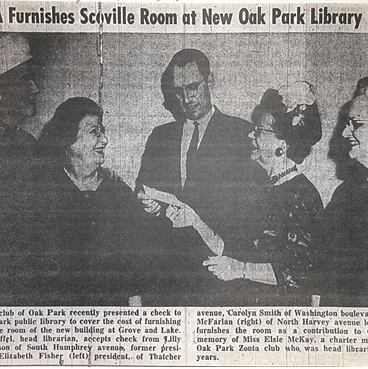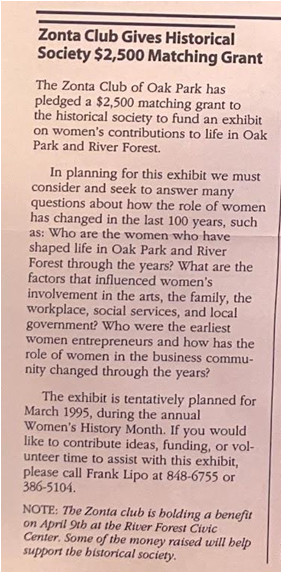Over the next several months, the WLA Blog will feature posts written by guest writers. These writers are graduate students in the Public History program at Loyola University Chicago. Each visited the archives during Fall 2021, delved into the collections, and wrote about a topic not yet explored here. We are excited to share their research and perspectives!
In 2012, the last President of Zonta International Oak Park donated an extensive collection of Zonta records to the Women and Leadership Archives. Within this collection, is an assemblage of newspaper clippings dating back to 1934 detailing the history of club activity through the years. These clippings reveal the impact of Zonta International’s service orientation in the village of Oak Park.

Theresa de Langis, Advancing The Status of Women Worldwide: A History of Zonta International 1919-1999 (Paducah, Kentucky. Turner Publishing Company, 2000), 5.

Zonta International was a club dedicated to advancing the goals of professional women. Zonta was founded by a group of professional, college educated women, including Marian deForest who led the charge in the club’s creation, in 1919. Founded partly in response to an abundance of men’s professional organizations, such as the Kiwanis Club, and the wave of feminism calling for equal rights that was surging through the nation, Zonta filled a niche that provided professional women the opportunity to network with each other. Along with this goal, Zonta also wanted to expand on making the world a better place for all. From the Zonta Code of Ethics adopted in 1921, the second line states “To honor my work and consider it an opportunity for service” [Figure A]. From the very beginning, the character of Zonta was to be a vessel for service [1].
Figure B: News Clipping, Oak Park Oak Leaves, April 8, 1937, Box 24, Folder 7, Zonta International Oak Park Chapter Records, Women and Leadership Archives, Loyola University Chicago.
Zonta experienced a period of expansive growth after its founding. The Oak Park chapter of Zonta was founded in 1934 and included women from a wide range of professions such as educators, librarians, physical therapists, management, orchestra, and ophthalmology [2]. Oak Park has long been a place of professions [Figure B]. Incorporated in 1902, the village is home to people such as Ernest Hemingway, Frank Lloyd Wright, Percy Julian, and Harriette Gillem Robinet and many more who all excelled in their respective fields [3].

Zonta Oak Park emphasized the role of service among the professional women of the village. A clipping from the Oak Leaves local newspaper is titled “Zonta Sponsors Citizenship Classes.” [Figure C] The Works Progress Administration, created by the New Deal, had previously hosted citizenship classes in Oak Park. After it’s dissolution in 1943, citizenship classes ceased to exist in Oak Park. That’s when Zonta, with community service in mind, decided to fill the void left by the federal government. The program, proposed by Miss Elsie McKay, was funded by Zonta and held at the Oak Park public library [4].
Figure C: News Clipping, Oak Park Oak Leaves, October 7, 1943, Box 24, Folder 8, Zonta International Oak Park Chapter Records, Women and Leadership Archives, Loyola University Chicago.

The story of Elsie McKay and the Oak Park public library did not end with the citizenship classes. In 1959, a proposal for a new library building was introduced. This proved to be too expensive, and many of the plans were vetoed. Again, Zonta stepped up and stepped in to fill the void. The club gathered more than $3,000, about $27,500 in 2021, to construct a room in the new building. This room was dedicated to Miss Elsie McKay, the head librarian from 1927 to 1952 [Figures D & E]. Again, Zonta illustrated its dedication to advancing the community [5].
Figure D: News Clipping, Oak Park Oak Leaves, April 5, 1962, Box 24, Folder 10, Zonta International Oak Park Chapter Records, Women and Leadership Archives, Loyola University Chicago.

A news clipping from an October, 1982 issue of the Wednesday Journal, another local publication, described some of the service activities engaged by the women of Zonta. [Figure F] In the sector of health care, Zontians put together “Christmas Bags” with toiletries and essentials for low-income patients and began a hospice program that dispatched Zontians to the homes of the ailing to keep them company in their final days. Zonta Oak Park also continued to provide support in the field of education as well as child development. They organized a seminar on stress management at Rosary College (later known as Dominican University), donated $500,000, almost $1.5 million in 2021, to UNICEF to build wells in Sri Lanka, and even “adopted” children. These “adoptions” were financial sponsorships for young girls across the nation. In 1982, Angela McCoy, a Native American girl from North Carolina received the financial support of Zonta Oak Park [6].



Zonta Oak Park continued throughout the 1990’s in its efforts to advance the community. A particularly interesting episode in the history of Zontian service came from their contribution to the history of the community itself. In 1994, Zonta pledged a grant of $2,500 to fund an exhibit detailing the history of women’s contributions to Oak Park and River Forest. [Figures G & H]
Figure H: News Clipping, Village Yesteryears, February 1994, Box 24, Folder 11, Zonta International Oak Park Chapter Records, Women and Leadership Archives, Loyola University Chicago.
The exhibit sought to answer these questions: “Who are the women that shaped life in Oak Park and River Forest through the years? What are the factors that influenced women’s involvement in the arts, the family, the workplace, social services, and local government? And who were the earliest women entrepreneurs and how has the role of women in the business community changed throughout the years?” [7].
A final example of community service comes from the September 2, 2009 edition of the Wednesday Journal. [Figure I] A piece written by then president Karen Herman DeMuro titled, “All right, already – ratify women’s rights treaty,” urged “everyone to contact Senator Burris and Durbin to ask them to do everything they can to see that the U.S. Senate to finally ratify the Convention to Eliminate All Forms of Discrimination Against Women treaty” [8]. This United Nations chartered treaty sought to bind nations into outlawing all forms of discrimination against women, and was only left to be ratified by the United States, Iran, Sudan, and Somalia in 2009.

These examples of Zontian community service in Oak Park and internationally represent testaments to the beneficent nature of the club. The professional women of Oak Park left a lasting legacy on the village as harbingers of social good. From support of the arts, education, medicine, policy, history, and much more, the Oak Park chapter of Zonta International is intricately woven into the fabric of the town. While the club ceased to exist in 2012, the lasting good brought upon by the club lives on in perpetuity.

Dariel is a first year Public History MA student. A Chicago native and a high school history teacher, he is always looking for ways to make local history fun and engaging for young people in the community he serves.
Endnotes
[1] Theresa de Langis, Advancing the Status of Women Worldwide: A History of Zonta International 1919-1999 (Paducah, Kentucky: Turner Publishing Company, 2000), 5.
[2] Loyola University Chicago. Women and Leadership Archives. Collection Title. Box 24, Folder 7.
[3] “Hometown Legends,” Oprfmuseum.org, The Historical Society of Oak Park and River Forest, http://oprfmuseum.org/people/hometown-legends
[4] Loyola University Chicago. Women and Leadership Archives. Collection Title. Box 24, Folder 8.
[5] Loyola University Chicago. Women and Leadership Archives. Collection Title. Box 24, Folder 10.
[6] Loyola University Chicago. Women and Leadership Archives. Collection Title. Box 24, Folder 12.
[7] Loyola University Chicago. Women and Leadership Archives. Collection Title. Box 24, Folder 13.
[8] Loyola University Chicago. Women and Leadership Archives. Collection Title. Box 24, Folder 14.
Loyola University Chicago’s Women and Leadership Archives Blog is designed to provide a positive environment for the Loyola community to discuss important issues and ideas. Differences of opinion are encouraged. We invite comments in response to posts and ask that you write in a civil and respectful manner. All comments will be screened for tone and content and must include the first and last name of the author and a valid email address. The appearance of comments on the blog does not imply the University’s endorsement or acceptance of views expressed. Questions? Please contact the WLA at wlarchives@LUC.edu.
